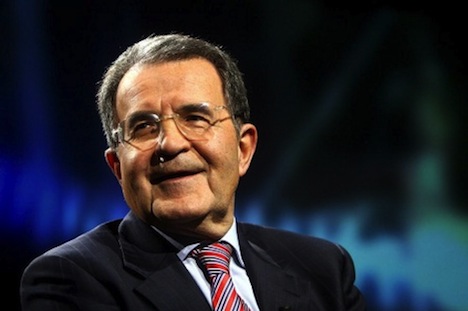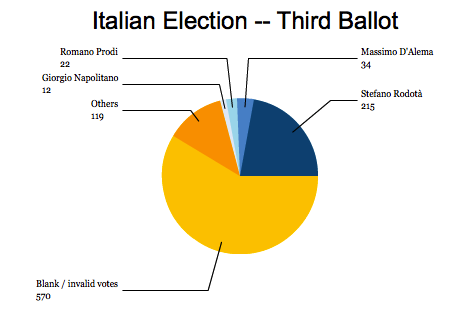So with the third ballot completed in the election of Italy’s new president, the centrosinistra (center-left) has a new candidate for the fourth ballot — which can be won by a simple majority — former prime minister Romano Prodi.![]()
Prodi is no doubt the most successful member of the Italian center-left in postwar history, winning the 1996 and the 2006 elections, though he failed to serve out the full terms in either case.
On the one hand, Prodi is a superb, even canny, choice — he has much more international credibility than Franco Marini as a former president of the European Commission, he has a lot of goodwill for pushing through a limited set of reforms in the mid 1990s to prepare Italy for entering the eurozone, and he’s generally an even broker. It’s a much safer bet for the leader of the Partito Democratico (PD, Democratic Party), Pier Luigi Bersani, who will have re-united his coalition after so damagingly supporting Marini on the first ballot as a consensus candidate who won the backing of Silvio Berlusconi and his centrodestra (center-right) that drew howls from within Bersani’s own party. Both Florence mayor Matteo Renzi and the leader of the more leftist Sinistra Ecologia Libertà (SEL, Left Ecology Freedom), Nichi Vendola, will support Prodi, and the centrosinistra seems likely to rally around Prodi.
But it’s left Berlusconi angry and further apart than ever from Bersani, which means elections are likelier sooner rather than later. It’s a much more blatantly political choice than many of the past Italian presidents:
- current president Giorgio Napolitano was a former Communist, but widely respected and out of the political fray upon his election in 2006;
- his predecessor Carlo Azeglio Ciampi was a former president of the Banca d’Italia, Italy’s central bank, and a former short-term technocratic prime minister when he was elected in 1999;
- his predecessor, in turn, Oscar Luigi Scalfaro, was a former Christian Democrat and magistrate, elected in 1992.
Prodi’s candidacy will also rankle members of the Movimento 5 Stelle (M5S, the Five Star Movement), not to mention the fact that, despite his absence from frontline politics since 2008, Prodi still represents much of the old fights of the past 20 years in Italian politics.
Berlusconi’s Popolo della Libertà (PdL, People of Freedom) will cast blank ballots on the fourth vote, and the Five Star Movement will continue to support former leftist parliamentarian and legal scholar Stefano Rodotà.
Although the center-left controls nearly a majority of the seats in the electoral college, it will still need a handful of additional votes for Prodi to win on the fourth ballot, and that’s provided that none of the centrosinistra breaks ranks in what is a secret ballot. So Prodi’s election is far from certain — if he fails, it’s not certain what will happen on the fifth ballot.

